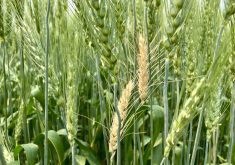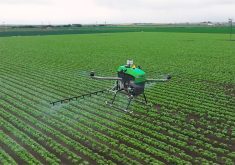A steadily rising carbon tax has a lot of Western Canada’s grain farmers wondering how they’ll compete in world markets against competitors not subjected to a similar tax.
“I think the world market is also looking towards a greener economy and always more sustainable agriculture,” federal Agriculture Minister Marie-Claude Bibeau said when the question was put to her Tuesday during an online session with members of the Canadian Farm Writers Federation.
“All the revenues coming from the price on pollution will be redistributed within the provinces,” she said, and the government intends to spend some of the carbon tax to help farmers use new technology to cut their carbon emissions.
Read Also

Senft to step down as CEO of Seeds Canada
Barry Senft, the founding CEO of the five-year-old Seeds Canada organization is stepping down as of January 2026.
In its “strengthened” climate plan, ‘A Healthy Environment and a Healthy Economy,’ released last Friday, the federal government said that after the carbon tax hits $50 a tonne in 2022, it will increase by $15 a tonne per year and reach $170 a tonne in 2030.
It’s expected to eventually boost gasoline prices by 27 cents a litre. However, as is the case now, Ottawa expects to rebate much of the money to citizens, resulting in net gains for them if they find ways to reduce carbon emissions.
While the farm fuels used in equipment are carbon tax-exempt, fossil fuels used to ship and transport grain, heat barns and make nitrogen fertilizer are not.
Ottawa’s plan calls for investment of $165.7 million over seven years to support the agricultural industry develop “transformative clean technologies” and to help farmers adopt “commercially available clean technology.”
“Besides this fund we have also announced in this plan… more than $350 million through the National Climate Solutions and the Agriculture Clean Technology programs so there are a lot of programs to help farmers access these new technologies,” Bibeau said.
“The ‘living labs’ is a good example. We’ll invest more because we found it was important to have research scientists and producers working together in the field and it was the best way also to make sure their findings are shared and multiplied. Through the same plan there will be a lot of support for farmers.”
The government is also considering “border carbon adjustment” to keep Canada competitive.
“Border carbon adjustments level the playing field across jurisdictions: they put a carbon fee on imports from countries that either do not have carbon pricing or price it too low so that those products face the same costs as those supplied by domestic producers who pay a price on carbon pollution,” the government’s report says.
“As such, border carbon adjustments can help maintain competitiveness while also encouraging other countries to step up and take effective action to reduce emissions.
“The government of Canada will work with like-minded economies, including the European Union and Canada’s North American partners to consider how this approach could fit into the broader strategy to meet climate targets while ensuring a fair environment for businesses.”
The report doesn’t say if such a policy is permissible under world trade rules. The strategy would presumably raise prices for Canadian consumers buying those taxed imports.
The report also doesn’t explain how applying a carbon tax on imports would make Canadian exports, including grain, more competitive.
— Allan Dawson reports for the Manitoba Co-operator from Miami, Man.
















